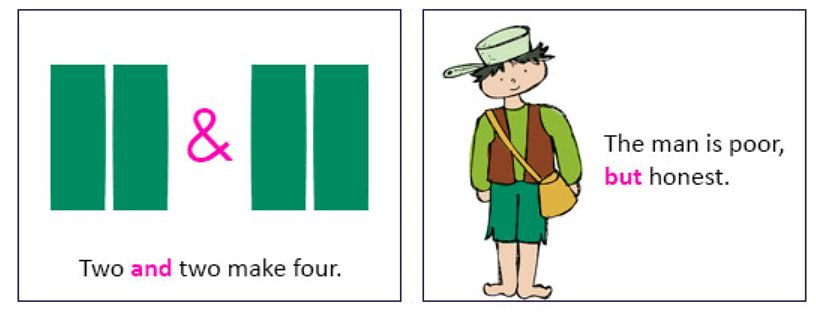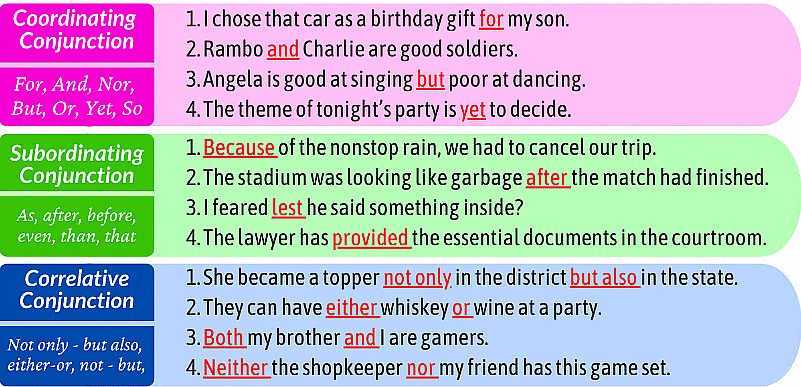Class 10 Exam > Class 10 Notes > English Grammar Basic > Key Notes: Conjunctions
Key Notes: Conjunctions | English Grammar Basic - Class 10 PDF Download
Conjunctions
A Conjunction is a word which joins together sentences and sometimes words.
 We use conjunctions to:
We use conjunctions to:
- Add information: Words like furthermore, in addition, and moreover are used.
- Express similarity: Phrases like in the same way and similarly are examples.
- Show difference: Words such as while, whereas, but, and instead are used.
- Express purpose: Phrases like so that, otherwise, in order to, in case, and for are examples.
- Indicate time: Words like when, after, as, and as soon as are used.
Note:
- We use ‘and’ to join similar facts or statements.
- We use ‘but’ to express the contrast between the two statements.
- We use ‘or’ to express a choice between two alternatives.
Conjunctions may be used in pairs as well.
- Either-or-Either stands up or leaves the class.
- Neither-nor-He can play neither cricket nor basketball properly.
- Whether-or-I does not know whether to believe you or not.
- The both-and-Our teacher is both honest and hard-working.
- The not only-but also-The child is not only naughty but destructive also.
Note: Such types of conjunctions are also called correlative conjunctions. These are used immediately before the words are connected.
There are certain compound expressions also which can be sometimes used as connectors like even if, as though, so that, as well as, provided that, in order that, etc.
Examples:
- She walks as if she were lame.
- I will give you money provided that you promise to return it one time.
- He is good-looking as well as well-mannered.
Types of Conjunctions
A. Co-ordinating Conjunctions:
- These types join clauses of equal rank.
- Example: Finish the work or I will complain against you.
B. Subordinating Conjunctions:
- These types join a clause with another on which it depends for its complete meaning.
- Example: We eat so that we may live.
C. Correlative Conjunctions:
- Correlative conjunctions are conjunctions used to illustrate how two words or phrases within a sentence relate to each other. Correlative conjunctions always come in pairs.
- Example: We could either hike up the mountain or swim in the lake this afternoon.

Uses of Conjunctions
- Not only ..... but also is used before the words it emphasises.
- Neither is followed by nor, while either is followed by or.
- Both is followed by and.
- Though and although are followed by yet.
- Even if is followed by but.
- That cannot be used for questions or commands.
- Whether is followed by or or not.
- When is used when two actions happen one after the other; use while for simultaneous actions.
- Lest is followed by should; do not use another negative with it.
- No sooner is followed by than; after no sooner, use a helping verb.
- Other is followed by than.
- Until is used for time, while unless is used for condition; do not use another negative with them.
- Scarcely, hardly, and barely are followed by when; use a helping verb before the subject after these words.
- So and so that are used for cause and purpose, and cannot be used negatively.
- Nothing is followed by but.
- After verbs like treat, regard, describe, present, portray, define, depict, etc., use as before the noun.
- Such is followed by as.
The document Key Notes: Conjunctions | English Grammar Basic - Class 10 is a part of the Class 10 Course English Grammar Basic.
All you need of Class 10 at this link: Class 10
|
20 videos|143 docs|18 tests
|
FAQs on Key Notes: Conjunctions - English Grammar Basic - Class 10
| 1. What are conjunctions and why are they important in English grammar? |  |
Ans. Conjunctions are words that connect phrases, sentences, or clauses. They play a crucial role in English grammar as they help to create complex sentences, improve flow, and clarify relationships between ideas.
| 2. Can you provide examples of different types of conjunctions? |  |
Ans. Yes, there are three main types of conjunctions: coordinating conjunctions (such as 'and,' 'but,' and 'or'), subordinating conjunctions (like 'because,' 'although,' and 'if'), and correlative conjunctions (for instance, 'either...or,' 'neither...nor').
| 3. How do coordinating conjunctions differ from subordinating conjunctions? |  |
Ans. Coordinating conjunctions connect words, phrases, or independent clauses of equal importance, whereas subordinating conjunctions connect an independent clause with a dependent clause, indicating a relationship where one clause relies on the other.
| 4. What are some common mistakes people make when using conjunctions? |  |
Ans. Common mistakes include using conjunctions to connect incompatible clauses, omitting conjunctions when necessary, or misplacing them within a sentence, leading to confusion in meaning.
| 5. How can I improve my use of conjunctions in writing? |  |
Ans. To improve your use of conjunctions, practice writing complex sentences, read various materials to see different conjunctions in action, and revise your work to ensure clarity and proper conjunction usage.
Related Searches






















